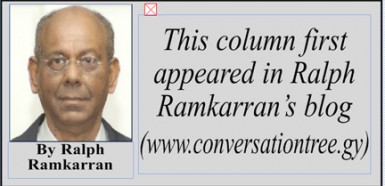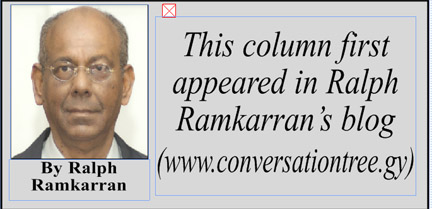 October 5 will forever be remembered in the history of Guyana as the date when a short-lived democracy was restored. Our freedom was obtained on May 26, 1966. The period of formal democracy lasted from 1966 until 1968 when it was crushed by rigged elections.
October 5 will forever be remembered in the history of Guyana as the date when a short-lived democracy was restored. Our freedom was obtained on May 26, 1966. The period of formal democracy lasted from 1966 until 1968 when it was crushed by rigged elections.
The rigging of the 1968, 1973, 1980 and 1985 elections have been fully documented elsewhere. But the entire gamut of manipulative techniques was employed. Laws were passed that removed all but the formal powers of the Elections Commission and handed over the management of the elections to the Chief Elections Office. The free press was destroyed and Parliament unrepresentative. But opposition to the rigging of elections never subsided.
A national struggle took place towards the end of the 1970s against the referendum to remove the requirement for a referendum to amend the constitution. This triggered substantial political and civic unity. The referendum turned out to be massively rigged with only 15 per cent of the electorate voting. The unity forged in this period was sustained until the restoration of free and fair elections in 1992.
The loss of Walter Rodney, the defeat in the referendum struggle in the late 1970s, the imposition of the new constitution in 1980 and the rigging of the elections of that year, sapped enthusiasm but did not diminish the struggle of for free and fair elections, which was attracting more and more adherents in and out of Guyana and took new forms.
Gorbachev became the new leader of the Soviet Union in 1985. There followed a transformation in relations between the Soviet Union and the United States and Europe. In Nicaragua, where a decade old civil war had been ongoing, the Sandinista government agreed in 1989 to have supervised elections, supported by both the Soviet Union and the United States. Cde Cheddi Jagan wrote to both President Bush and President Gorbachev in 1989 calling for the same treatment for Guyana – supervised, free and fair, elections – that Nicaragua was receiving. Then came President Bush’s 1990 Republic Day message, in apparent response to Dr Jagan’s letter, calling for free and fair elections.
Free and fair elections have transformed Guyana and the PNC itself, under various names. In conducive conditions, APNU has now proved that it can win.
The loss of elections after twenty years in power is traumatic for anyone as it was for the PPP. But a certain political logic sometimes exists. After two terms of the popular Bill Clinton administration, Al Gore lost the elections to George W Bush. He had no independent, compelling vision. After two terms of the historic Barack Obama presidency, Hillary Clinton lost to Donald Trump. Mrs Clinton had no independent, compelling vision, other than that she was a woman.
The PPP needed another inspiring, compelling, vision. The “dawn of a new era” of 1992 no longer inspired. After four terms, the PPP was under severe criticism for many things, including corruption. Despite much progress, some of these criticisms were resonating, dangerously, among PPP supporters.
In any part of the rational political world, the largest minority parties negotiate the support of one or more of the other political parties to ensure majority support to carry out its programme. This happens all over Europe and is happening in Germany as we speak. In 2011 the PPP was the largest minority party and had two political parties in opposition, the APNU and the AFC. The refusal of the PPP to negotiate a coalition, or even a support arrangement, with either, or both, of these parties could have only political suicide as its natural outcome.
One would have thought that once bitten, twice shy. Facing a formidable coalition of APNU+AFC in 2015, the PPP once again offered more of the same, but not a vision of the future that the people craved. By this time the electorate was hungry for a vision of political compromise to end the gridlock which prevailed between 2011 and 2015.
We don’t know what 2020 election year holds for us. Every year the need grows for what Cheddi Jagan called a “political solution,” the end of “winner take all” politics. This will end a half a century of political strife and instability based on ethnic suspicion, insecurity and discord.
The controversies already surrounding the issues of oil demonstrate that a political solution is now more vitally necessary. Unless there can be agreement as to how the oil wealth is going to be managed, Guyana will end up like so many other oil countries which squandered their oil wealth, benefiting only those at the top. Whether Guyana will be a better and safer country for all of us will depend on whether we can arrive at that ‘political solution.’ It was offered by Cheddi Jagan during his entire lifetime. It has now been adopted by APNU+AFC in its election manifesto in a different ‘winner does not take all’ system – separate presidential and parliamentary elections; the candidate in second place becoming the prime minister; and all parties with fifteen per cent of the votes having a seat in the government. David Granger and Bharrat Jagdeo need to talk. (October 8, 2017, New York: condensed and amended).











